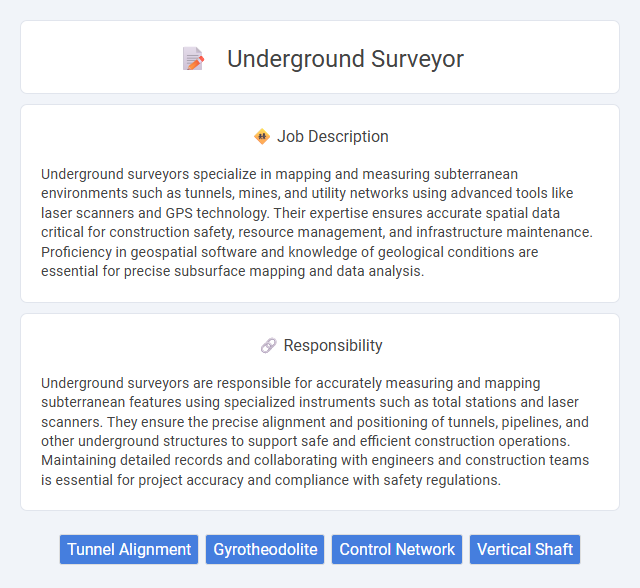
Underground surveyors specialize in mapping and measuring subterranean environments such as tunnels, mines, and utility networks using advanced tools like laser scanners and GPS technology. Their expertise ensures accurate spatial data critical for construction safety, resource management, and infrastructure maintenance. Proficiency in geospatial software and knowledge of geological conditions are essential for precise subsurface mapping and data analysis.
Individuals with strong physical endurance and a willingness to work in confined, often dark and damp environments are likely to be well-suited for a role as an underground surveyor. Those who experience claustrophobia or have difficulty adapting to inconsistent workspaces and varying temperatures might find the job challenging. The position may appeal most to people who enjoy technical problem-solving and precise measurements in unique, sometimes harsh conditions.
Qualification
An underground surveyor requires expertise in geospatial measurement techniques, proficiency with advanced surveying equipment such as total stations and GPS, and a solid understanding of geological structures and mining operations. Candidates typically hold a degree in geomatics, surveying, civil engineering, or a related field, combined with certification from recognized professional bodies like the Royal Institution of Chartered Surveyors (RICS). Practical experience in underground environments and strong skills in data analysis and mapping software are essential for accurate and safe measurements in complex subterranean conditions.
Responsibility
Underground surveyors are responsible for accurately measuring and mapping subterranean features using specialized instruments such as total stations and laser scanners. They ensure the precise alignment and positioning of tunnels, pipelines, and other underground structures to support safe and efficient construction operations. Maintaining detailed records and collaborating with engineers and construction teams is essential for project accuracy and compliance with safety regulations.
Benefit
An underground surveyor likely benefits from exposure to cutting-edge surveying technology and methods, enhancing technical skills and career prospects. This role probably offers a unique working environment that fosters problem-solving abilities in challenging subterranean conditions. Opportunities for high earning potential and job stability may also be significant advantages in this specialized field.
Challenge
Underground surveyor roles may involve navigating difficult and confined spaces, which could pose significant challenges related to safety and precision. The probability of encountering unexpected geological conditions means surveyors must adapt quickly and use advanced technology to maintain accuracy. Limited visibility and restricted access might further complicate measurements, requiring a high level of expertise and problem-solving skills.
Career Advancement
Underground surveyors specialize in mapping and measuring subterranean structures, a skill set increasingly sought after in mining, construction, and infrastructure projects. Career advancement typically involves gaining expertise in advanced geospatial technologies, expanding knowledge in tunnel engineering, and obtaining professional certifications such as those from the Surveying and Mapping Society. Progression often leads to roles like senior surveyor, project manager, or consultant, with opportunities to work on large-scale underground development initiatives globally.
Key Terms
Tunnel Alignment
Underground surveyors specializing in tunnel alignment use advanced geospatial technology to ensure precise tunnel positioning, critical for structural integrity and safety. They interpret geological data and employ laser scanning, total stations, and GPS surveying methods to guide tunnel excavation along design parameters. Accurate tunnel alignment minimizes construction risks and optimizes project timelines in infrastructure development.
Gyrotheodolite
Gyrotheodolites play a crucial role in underground surveying by providing precise azimuth measurements in GPS-denied environments, enabling accurate tunnel alignment and navigation. Underground surveyors utilize gyrotheodolites to establish true north reference points, ensuring the structural integrity and efficiency of subterranean construction projects. Mastery of gyrotheodolite operation significantly enhances the accuracy and reliability of spatial data critical for successful underground excavation and engineering.
Control Network
An underground surveyor specializing in control network establishes precise geospatial reference points essential for tunneling and excavation projects. They utilize advanced instruments like total stations, GNSS receivers, and laser scanners to create accurate control networks that ensure alignment and structural integrity. Mastery of data processing software enhances the accuracy of measurements and supports real-time adjustments during underground construction.
Vertical Shaft
Vertical shaft underground surveyors specialize in measuring and mapping deep vertical excavations used for mining, tunneling, and construction. They utilize advanced instruments like total stations, laser scanners, and gyroscopes to ensure precise alignment, depth, and position of vertical shafts. Accurate vertical shaft surveying is critical for safety, structural integrity, and efficient resource extraction in complex underground environments.
 kuljobs.com
kuljobs.com